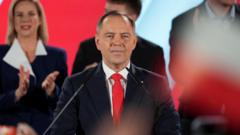A general, once part of a long-standing autocracy, is favored to win despite claims of an imbalanced electoral process.
**Gabonese Presidential Election Shaped by Controversy and a Coup Leader's Dominance**

**Gabonese Presidential Election Shaped by Controversy and a Coup Leader's Dominance**
As Gabon prepares for its presidential election, concerns about fairness and a military regime’s lingering grip on power come to the forefront.
In Gabon, voters are gearing up to elect a new president this Saturday amid significant controversy. While the ballot boasts a diverse array of candidates, including a tax inspector and a female candidate, many observers believe the race is skewed in favor of General Brice Oligui Nguema, who orchestrated a coup in 2023. Initially, Nguema had assured the nation he would ultimately transfer power back to civilian leadership, but experts note he has since abandoned this pledge.
Joseph Siegle, the director of research at the Africa Center for Strategic Studies, highlighted the pervasive inequalities affecting the electoral landscape, stating, “It is not a level playing field to begin with.” Gabon, a country abundant in resources and home to 2.5 million people, has historically been ruled by a single family, leading to rampant unemployment and poverty despite its relative wealth compared to other sub-Saharan nations.
With increasing scrutiny on Nguema, who has traded his military attire for casual jeans and sneakers during his campaign, many political analysts assert that he is poised for an easy victory. His previous roles included serving as an aide-de-camp to former autocrat Omar Bongo and leading the Republican Guard under Bongo’s son, Ali Bongo Ondimba, who was overthrown last year. Given the central role of the military in Gabonese politics, the upcoming election will likely reflect a continuation of the entrenched power dynamics.
Joseph Siegle, the director of research at the Africa Center for Strategic Studies, highlighted the pervasive inequalities affecting the electoral landscape, stating, “It is not a level playing field to begin with.” Gabon, a country abundant in resources and home to 2.5 million people, has historically been ruled by a single family, leading to rampant unemployment and poverty despite its relative wealth compared to other sub-Saharan nations.
With increasing scrutiny on Nguema, who has traded his military attire for casual jeans and sneakers during his campaign, many political analysts assert that he is poised for an easy victory. His previous roles included serving as an aide-de-camp to former autocrat Omar Bongo and leading the Republican Guard under Bongo’s son, Ali Bongo Ondimba, who was overthrown last year. Given the central role of the military in Gabonese politics, the upcoming election will likely reflect a continuation of the entrenched power dynamics.




















